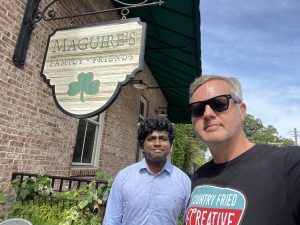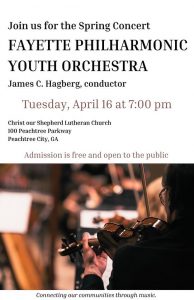Peachtree City resident Soumaya Khalifa got the thrill of a lifetime recently when she was invited to the White House in Washington, D.C. to be a guest of President Barack Obama at a special Iftar, a dinner where Muslims break their day-long fast during the holy month of Ramadan.
In fact, Khalifa sat at the President’s table during the dinner, which is an annual tradition that dates back to the days of President Abraham Lincoln and though it fell by the wayside was revived in recent years by Presidents Bill Clinton and George W. Bush.
Khalifa, the founder of the Islamic Speakers Bureau of Atlanta, noted that she was one of seven women selected to sit at the President’s table, and he spoke with them about the importance of women’s contributions to the Muslim American culture.
Khalifa said others at the table included a college student who wrote the president about what it was like to be an American Muslim, and an American Muslim fencer who was headed to the Olympics before she was injured.
“Several of the women he recognized by name,” Khalifa said. “… I’d have loved the opportunity to do speed networking with the 120 people who were there. You had ambassadors from different countries and leaders from the Muslim American communities all over the country. It was pretty amazing.”
Khalifa says she is still not sure how she got the invitation that first showed up in an email while she and her husband were driving down the road.
“I have been wanting to go to the White House forever,” Khalifa said. “I have wanted to meet the President of the United States. So this was like a dream come true for me. I was so excited.”
Khalifa in her role with the speakers bureau has conducted some training sessions for the U.S. State Department, and she also works with the U.S. Department of Justice on matters pertaining to Muslim Americans, knowledge which she also uses to help train local police departments on issues such as Muslim customs.
Khalifa, who moved to Peachtree City in 1988, founded the Islamic Speakers Bureau of Atlanta in 2000 in part as a response to her own mixed cultural identity. Born in Egypt, she is of Arab descent and is a Muslim, and after her parents moved to Texas when she was a child, she grew up as an American.
“I assimilated into American culture really well, and so through my journey I decided I can’t have identities where I’m not comfortable with all of them being under one person. So I started looking at myself and who I am and I said I’m all three people, and I’m OK with that, and I’m ready to tell people who I am.”
Khalifa stressed that the speakers bureau is not aimed at converting anyone to the Muslim religion, rather it is designed to foster education and understanding about the religion and its practices.
For example, people who are not Muslims may look at women who wear a traditional headdress or scarf, and assume that their husbands are very strict. The fact is, however, that such is a personal choice for women, as many Muslims particularly of younger age decide to forego the scarves.
“Really for that to be accepted as an act of Muslim worship, it needs to be of her own free will,” Khalifa said.
While the scarf is part of the Muslim modesty code for women, men must also obey it but in less obvious ways including not wearing tight jeans, for example, Khalifa said.
While some Muslim-majority countries have rules that are oppressive to women such as a ban on them driving for example, those are rules that stem from the countries themselves, not from the Muslim faith, Khalifa said.
The Kuran teachers that men and women are equals who have roles and responsibilities,” Khalifa said. “They are each accountable for their own actions.”
Because of the terroristic attacks of September 11, 2001, it has become a very hostile time for Muslim Americans, Khalifa noted, adding that it has become politically correct to bash Muslims now as it was in previous generations to do the same toward Catholics and Jews.
“I guess now it’s our turn for the Muslims, a rite of passage, whatever you want to call it,” Khalifa said.
The speakers bureau, however, combats such problems by educating others on the religion and culture of Muslim Americans.
In another example, Khalifa noted that the Kuran says “that if a person takes an innocent life, it’s as if they killed all humanity, and if a person saves a human life, it’s as if they saved all humanity.”
Khalifa said it is accepted in the Muslim faith that God is the only being charged with determining life or death, not human beings themselves.
The terrorists who used their Islamic faith to justify killing Americans “under the name of a religion are absolutely, I just don’t even know the word for it,” Khalifa said.
“I understand as Americans we were deeply hurt. We lost lives,” Khalifa said. “And it was nothing like we have ever experienced before. It shook the core of who we are, and we look at the people who lost their lives, and their families, and you know our country has changed so much since that horrific day. What also has been really terrifying as well is that Muslims have been impacted very negatively since that day in their every day life as well. So the people who did 9/11 hijacked their religion as well. And the American Muslims are paying a very dear price for that.”
At the same time, though, Muslims all across America are involved in bettering their communities, Khalifa said, pointing to an effort in Fayette County to provide summer lunches to school-age children who receive free lunches during the school year.
“We started about six or seven years ago with about 100 lunches, and this year we’re up to over 350,” Khalifa said. “It’s a lot of work but we feel like this is giving back to the community and we love doing it. It brings that humanity, the ideal of connecting with our fellow human beings.”
It is that essence of humanity that also fuels Khalifa, who has been energized by her work with the speakers bureau.
“It has been a very wonderful journey that has enriched me personally, and allowed me to interact with so many amazing people at all levels,” Khalifa said.
Khalifa also noted a verse in the Kuran that says God created humanity into different nation and tribes so they could get to know one another.
“If God wanted all of us to be the same, he would have done that,” she said. “He has that power, you know.”
Khalifa has a challenge for everyone, too. And that is to find an individual who looks very different than you, sit down and talk with them, get to know them.
People who take the time to do that are almost always amazed at how much common ground they can have with someone who looks different than they do, Khalifa said.











Leave a Comment
You must be logged in to post a comment.